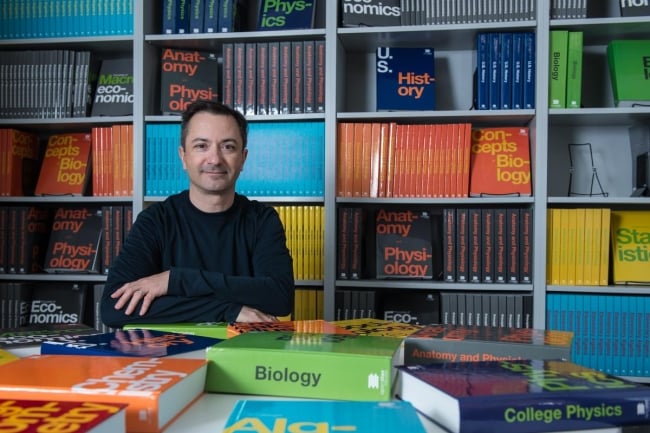You have /5 articles left.
Sign up for a free account or log in.

OpenStax founder Richard Baraniuk in front of a selection of their OER titles. John McMurry's Organic Chemistry will be the first international bestseller added to the nonprofit's catalog.
Courtesy of OpenStax
John McMurry's textbook Organic Chemistry has helped millions of students across the globe pass the infamous gauntlet of its namesake class -- also known among stressed-out pre-med students as "orgo" -- since the book was first printed in 1984.
For his bestseller's 10th edition, McMurry has decided to part ways with his longtime publisher, the industry giant Cengage, which has published the book since the beginning. He recently sold the rights to OpenStax, a nonprofit based at Rice University that is dedicated to developing open education resources (OER), learning and research materials created and licensed to be free for the user.
That means for the first time, the digital version of Organic Chemistry and its accompanying solutions manual -- usually priced at almost $100 -- will be available for students to download free.
"My textbook is the best selling organic textbook in the world and has been for some time, but it's expensive. All textbooks are expensive," McMurry said. "I liked the notion of making my work free for anyone."
OpenStax will pay McMurry a licensing fee for the rights, as opposed to the traditional royalty model used by publishers like Cengage, but McMurry won't be accepting it. He plans to donate it directly to the Cystic Fibrosis Foundation, a nonprofit research center seeking a cure to the life-threatening genetic disorder, in memory of his son Peter, who passed away in 2019 after a decades-long battle with the disease.
Acquiring the rights to Organic Chemistry is a big deal for OpenStax, which has primarily focused on developing its own materials, largely for intro classes, since it was founded in 2012. It's also a potential watershed moment for OER as the movement for open access educational materials gains prominence in the academic publishing space.
"This particular book marks the culmination of a decade of work," said Richard Baraniuk, founder and director of OpenStax. "It's really driving home the fact that OER is going mainstream."
"It's a big deal to see a top-tier author select an OER publisher for future editions of a best-selling textbook," said Nicole Allen, director of open education for the Scholarly Publishing and Academic Resources Coalition. "That's a really strong endorsement of not just the credibility of OER as a model but the benefits it offers to authors, students and higher education as a whole."
McMurry said the split from Cengage wasn't bitter so much as a natural growing apart.
"I had been working with Cengage for a long time, but it wasn't always good for both of us. I really was particularly upset at what textbook prices were doing," he said. "I'm just tired of them, and they're tired of me. I don't think either of us is all that upset."
"We are very proud of the success of this important title and the many years of strong partnership we enjoyed with John," Erin Joyner, Cengage's senior vice president for academic product, wrote in a statement to Inside Higher Ed.
Cengage will continue to produce some of the auxiliary digital material it has developed for the book over the years, such as interactive study guides, and will sell them at a lower price point than its usual products -- an arrangement the company has made with OpenStax before.
"We are fully committed to providing affordable, high-quality learning solutions for students," Joyner said. "We are excited to think openly and collaboratively with key partners like OpenStax to ensure that we, and our authors, are able to reach as many students as possible in new and highly accessible ways."
Even if OpenStax is more interested in partnering with traditional publishers than rendering them obsolete, Allen, the open access advocate, said its publication of McMurry's book is an important milestone in what she hopes is OER's march toward prominence in the textbook publishing sphere.
"What we see in the landscape right now is a sort of tale of two futures," she said. "In one future, higher education sees course materials as part of their digital infrastructure and takes ownership over how it's built, maintained and improved … The other future is what the publishing industry has been pushing toward, where there's a tollbooth in every classroom and students have to pay to enter it, not just tuition but to get access to their materials."
'Seminal Moment for OER'
McMurry is a prolific chemistry textbook author with 43 other titles under his belt, but Organic Chemistry is his most widely read. It's been a bestseller in the field for almost as long as it's been in print; McMurry even claims that it's the most popular organic chemistry textbook in the world. He has some ground to stand on: it's the only English-language resource used in India, Australia, Japan and Korea, and it's been translated into a litany of languages including German, Czech, Portuguese and Greek.
OpenStax specializes in developing its own materials in partnership with authors who haven't been as successful in the traditional publishing world, or in licensing books that have only done small print runs. Publishing Organic Chemistry is a break from this model -- and, OpenStax leaders hope, another step toward competing with the major publishers.
"This is the first time a current bestseller is going to be openly licensed and free to hundreds of thousands of students who take organic chemistry in a given year," said OpenStax editor-in-chief David Harris. "It's a seminal moment for OER."
OER has been growing even without big-name authors or best selling textbooks. According to a recent survey by Bay View Analytics, faculty use of OER materials grew significantly over the past few years, especially during the pandemic. In 2015 only 5 percent of faculty said they used OER course materials; in 2022 that number had jumped to 22 percent.
OpenStax, the foremost publisher of OER materials, saw its own user base grow by 183 percent from March 2020 to December of the same year, serving over 1 million more students in the 2020-2021 academic year than during the previous year. Harris estimates that in its first year on OpenStax's platform, over 50,000 students and other users will download the book.
"This is probably one of our most frequently requested titles, both because the subject matter is enormously difficult and because organic chemistry is, if not the most, maybe the second or third most expensive course," he said. "If you think about a community college student struggling and looking at a $300 to $500 course expense, this is going to make a huge difference in their lives."
Allen said the high quality of Organic Chemistry and its ubiquity in orgo classes around the world should confound critics who say OER materials are worse than those published through traditional means.
"The traditional publishers often say, 'there's no such thing as free lunch,' or 'how could it possibly be high-quality if it's free?'" she said. "This is a really interesting example that proves the age-old adage 'you get what you pay for' is false."
Michael Spinella, executive director of the Textbook and Academic Authors Association, said it's important for OER advocates to assure authors that their materials will be of the same, or at least comparable, quality to those from traditional publishers.
"I think the OER movement is right-minded. There are some real affordability problems for students. But quality was an initial big concern, and I'd submit that it's still a concern," he said. "It's great that organizations that are really devoted to OER and reducing cost for students are recognizing what it will take to bring in well-qualified, hard-working authors. But that means fair compensation for those authors, and also showing them you're not going to embarrass them."
Harris and Baraniuk say they are committed to paying their authors fairly, but their model differs from the traditional publishers': instead of inking a royalty deal, they provide a one-time fee for the licensing rights, pulled from funds usually acquired through grants from venture philanthropists. Harris said this model is often better for the textbook authors OpenStax works with, whom Harris called "the long tail" behind the minority of financially successful academic authors -- those who wouldn't necessarily sell enough units to make a lot in royalties, but who are committed to their work nonetheless.
"The truth of the matter is, only 5 percent of postsecondary or higher education authors ever get to the status of John McMurry, where you're a best seller and you're selling tens of thousands of units or subscriptions a year," Harris said. "The vast majority of authors aren't getting the marketing support, and they frankly don't have a lot of royalties. They do it to get their ideas across. … We're able to get authors who understand that, and we pay them for their work when they do it. There's no risk."
But Spinella said that while there's evidence to support the single-fee model's benefits for some authors, he's not sure many bestselling authors are likely to follow McMurry's lead.
"There are plenty of authors that work on OER projects. Usually it's just a chapter, because it's a ton of work to write a book and most people can't do that without more compensation," he said.
Honoring a Legacy of Kindness
It's not about the money for McMurry. He wants to honor his son's memory by giving back, and said the deal with OpenStax allows him to do this in two ways: by supporting life-saving research and making his book accessible to anyone.
"I don't want to sound like I'm trying to change the world. My motivation is to do something for Peter that will have a major effect," McMurry said. "It just made more sense to do something that's better for students in Peter's name."
It's a fitting tribute, he added, in part because organic chemistry is a required course for the vast majority of students who hope to become doctors -- in other words, those who might one day treat cystic fibrosis, or even find a cure. McMurry said he wanted to expand access to course materials so more students could pursue that goal, regardless of their ability to pay for expensive textbooks.
Peter was in and out of New York-Presbyterian Hospital so often, McMurry said, that he formed a relationship with some of the doctors who also happened to teach pre-med courses at Columbia University. He was invited to speak in front of a class one year -- an organic chemistry class, in fact -- to talk about his experience as a patient of cystic fibrosis. He was such a hit that he was invited back for 10 more years in a row.
McMurry said Peter would tell the same joke to each class, which went like this: "My dad writes organic chemistry textbooks, so I just want to thank you all for buying them -- even though you're required to."
They won't have to buy them anymore. And if they scroll through the first few pages of their now-free textbook, they'll find a heartwarming dedication to Peter.
"If I can take the most popular organic book and publish it for free, then there will be no competition, and even more people will read the book," McMurry said. "And I like the thought that everyone who reads it will see Peter."





